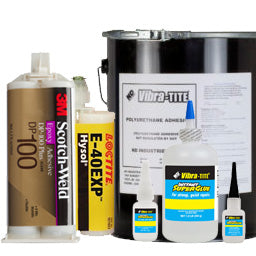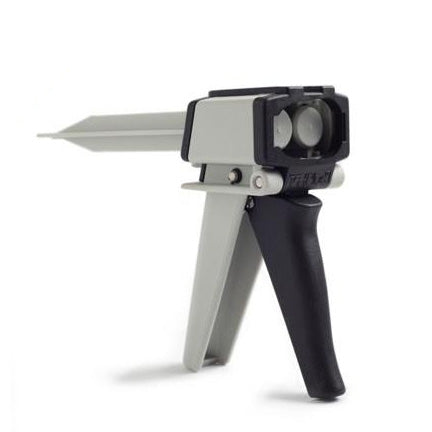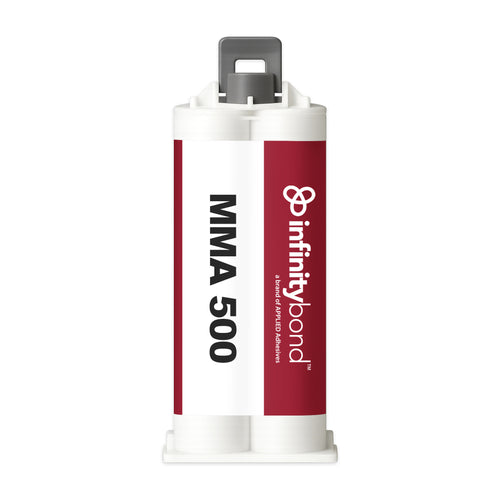Adhesives for Metal
Find the Best Glue for Your Metal Application
From time to time, you may need to fasten two or more pieces of metal together without bolting, soldering, or welding. Fortunately, there are special metal bonding adhesives on the market made for gluing metal. From glue sticks for metal to two-part adhesives, we carry a diverse collection of products for your metal gluing needs.
MMA Adhesives for Metal
MMA adhesives provide strong, structural bonds that cure quickly compared to many other types of adhesives. MMAs also come with various open times and properties to fit numerous application needs.
Metal Epoxy Adhesives
Epoxy forms some of the strongest metal-to-metal bonds. These two-part high-performance adhesives are often used in carpentry and woodworking or for specialized creative uses. They have different properties such as being flexible or rigid, transparent or opaque, fast or slow setting. They also offer high resistance to heat and chemicals.
Super Glue for Metal
Cyanoacrylate super glues are high-performance industrial adhesives that are perfect for almost all household fixes. Most bond well with metals, as well as fabrics, wood, and plastics, making them useful in joining or repairing car parts, ornaments, small appliances, and many other daily items.
Polyurethane PUR for Metal
Polyurethanes are also commonly used with metal. They are water-resistant, UV-resistant, and set quickly without being brittle. Once cured, they can be sanded, stained, and painted. They are moisture-curing adhesives and create stronger bonds than ordinary construction adhesives. Polyurethane works on metal across a wide range of temperatures, making it the best metal glue for outdoor use.
Metal Hot Melt Adhesives
Hot melt adhesives can be a good adhesive for metal when bonding to another substrate such as wood. Because it is not as strong as structural adhesives, it is not always the best metal glue for applications requiring strong bonds.
Go to:
Recommended Products

Best Overall Glue for Metal: Infinity Bond MMA 300
The Infinity Bond MMA 300 offers strong bonds to a wide range of substrates but does especially well with metals, plastics, and fiberglass. Like most methacrylates, MMA 300 offers great impact resistance and holds up under tough environmental conditions. The MMA 300 also has a tremendous ability to hold a bond under extreme hot and cold changes (aka thermo cycling) making it perfect for many product assembly and manufacturing operations.

Best Super Glue for Metal: Infinity Bond Methyl Super Glue Cyanoacrylate
Use the Infinity Bond Methyl Cyanoacrylate Super Glue for metal bonding in product assembly applications or where more rigid bonds are required. While most cyanoacrylates are ethyl based formulas, the Infinity Bond Methyl Super Glue is more rigid, making it superior for metal bonding applications.

Best PUR Hot Melt for Metal: Infinity PUR MP75 Multi-Purpose Polyurethane Adhesive
The Infinity PUR MP75 is a high performance polyurethane hot melt that bonds to a wide range of substrates. It offers a longer open time - around 75 seconds - giving users ample time to set their substrates or bond larger surfaces before the adhesive sets. MP75 can be used to bond wood, metal, plastics, cement, ceramic and more.

Best Hot Melt Adhesive for Metal: Infinity SuperTAC 88 Plastic and Metal Bonding Glue Sticks
Infinity SuperTAC 88 is a strong, versatile glue stick and is particularly good at bonding non-porous substrates. This means surfaces like plastic, metal, ceramic and more. Because SuperTAC 88 does well with typically difficult to bond surfaces, it lends itself well to a wide range of applications like product assembly, POP display manufacturing, furniture assembly and more.
Ask a question about Adhesives for Metal
Questions about these products? Not sure which is right for your application? Submit your questions and our adhesive experts will get you answers right away. We're here to help.
Related Categories
Common Questions About Adhesives for Metal
The best metal glues are generally epoxies, polyurethanes, or super glues, but the right adhesive for you will depend largely on the specific product and application.
Epoxy adhesives come in different types with different properties including being flexible or rigid, transparent or opaque, and fast or slow setting. They also offer high resistance to heat and chemicals.
Polyurethanes are also commonly used with metal. They are water-resistant, UV-resistant, and set quickly without being brittle. Once cured, they can be sanded, stained, and painted.
Super glues are high-performance industrial adhesives that are perfect for almost all household fixes. Most bond well with metal as well as fabrics, wood, and plastics, so they are useful in joining or repairing car parts, ornaments, small appliances, and many other daily items.
Wipe each surface with methyl ethyl ketone (MEK) or acetone, and use a clean cloth that won't leave fibers behind. Use a heavier degreaser if there is any oil or grease on the surface. Once you've removed the oil, give the surface a quick wipe with acetone or MEK to make sure that the degreaser is off. Adhesives tend to stick to metal surfaces better if you rough up the surface, so do some type of abrasion method and clean it once more after. Allow each surface to dry completely before you apply the metal adhesive.
Test your adhesive on a small surface area. If you see that the adhesive forms beads on the surface, then it isn't suitable for bonding that particular type of metal. Try it again after a light abrasion. You should be able to spread the adhesive evenly across the surface. When it distributes evenly without forming beads, then you probably have the right glue for the job. You can also contact our team for more guidance.
In most cases when you bond metals, you must get the two metal surfaces to bond with each other for a secure, long-lasting bond. If the surface is rusted or painted, and you don't remove the layer, then you're bonding rust to rust or paint to paint. Ultimately, the bond will likely break under any pressure. The same thing will happen with mold, dust, oil, or any other contaminant. Make sure you remove any surface materials or dirt before you attempt the bond. This helps ensure the strongest structural bond possible.


















